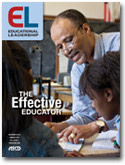Research Alert
Fewer Hours, Fewer Results?
- Nearly 75 percent of beginning teachers participate in induction programs, and 80 percent report having a mentor. A significantly lower percentage of teachers in high-poverty, high-minority schools report such supports.
- Teachers received fewer hours of professional development in 2008 than in 2004 in reading instruction, classroom management, and using computers for instruction.
- Two-thirds of teachers reported structured opportunities for collaboration, but time spent in collaboration averaged only 2.7 hours each week.
- Fewer than one-half of teachers reported access to professional development on teaching students with disabilities (42 percent) and English language learners (27 percent).
- Preferred professional development topics remained the same from 2004 to 2008, with teachers citing four areas as most essential: content knowledge, classroom management, students with special needs, and technology.
The report raised the issue of theintensity of professional development—that is, the number of hours that teachers receive training on a given topic. The authors concluded,In areas like reading instruction, uses of computers, and teaching of English language learners and special education students, U.S. investments in teacher learning appear to be increasingly focused on the least effective models of professional development—short-term workshops that research suggests are unlikely to influence practice and student achievement. (pp. v–vi)
Teachers reported engaging in an average of 44 hours of professional development during the previous 12 months. However, research suggests that for professional development to have significant effects on student achievement, teachers need at least 49 hours on a given topic and at least 100 hours in math and science.
Professional Development in the United States: Trends and Challenges , by Ruth Chung Wei, Linda Darling-Hammond, and Frank Adamson, is available atwww.nsdc.org/news/NSDCstudytechnicalreport2010.pdf.
World Spin
An End to Wild and Wacky
In the United Kingdom, British Education Secretary Michael Gove recently exhorted teachers to adopt a "commonsense" approach to teaching and stay away from what he called "wild and wacky" pedagogical methods that have distracted schools in the past. Instead, teachers should teach academic subjects rigorously and insist on strict standards of behavior. School uniforms are also high on his list.
Gove's comments come on the heels of a recent BBC documentary that suggests that Britain has a larger gap in performance between private and state schools than most other developed nations. The country has also witnessed a serious slump in the study of core subjects. The number of students achieving good results on the General Certificate of Secondary Education in five core subjects has declined to 15 percent over the past four years, whereas the number taking vocational qualifications has skyrocketed. Gove blames this circumstance on the Labor Party's decision to give non academic qualifications equal value in school rankings ("league tables"); he asserts that this move encourages schools to have their students take easier rather than more challenging exams.
Numbers of Note

Relevant Reads
How Teachers Become Leaders: Learning from Practice and Research by Ann Lieberman and Linda D. Friedrich (Teachers College Press, 2010).
What challenges do teachers face when they assume leadership roles in their schools and districts? Lieberman and Friedrich explored this question by asking teacher leaders to write a vignette about what they have learned from their leadership experience. The 14 educators who tell their personal stories in this collection include a teacher who found that her new role as assistant principal cut her off from her colleagues, a literacy director who discovered the value of teacher collaboration, and a district wide staff developer turned literacy coach turned 3rd grade teacher who discovered that each role enabled her to exert a different kind of leadership.
Only Online
A Lifeline—and More
Ever wished you could ask an accomplished teacher for help creating lessons, setting up your classroom, or handling a tough teaching dilemma? You've got a helpline now—at the Teachers Network website (www.teachersnetwork.org).
The helpline (http://teachersnetwork.org/aboutus/web_mentors.htm) connects visitors to teachers with expertise in areas ranging from using new media to adjusting instruction for language learners. Visitors can not only access lesson plans, activities, and articles that these "web mentor" teachers have posted related to their specialties, but also e-mail a practice-based question to a web mentor teacher and expect a response within 72 hours. There's also a New York City Teachers Helpline that connects to teacher mentors working in New York City schools.
- Teachers on Teaching, an 18-minute documentary that features interviews with classroom teachers around the United States. The teachers frankly discuss what drew them to teaching, why they stay, and what kinds of supports and learning opportunities they believe teachers need to remain in the teaching profession.
- The Network's Teachnet project, which features a large database of free units and classroom projects. Users can search 12 subject areas—including special education, the arts, and health—and pull up detailed descriptions of units or projects created by participating teachers, grouped into elementary, middle, and high school levels. You'll find lesson plans and assignments, lists of materials needed, a review of the standards that the unit or project meets, tips for teaching the unit, and teacher contact information.
PageTurner
"A commitment to professional learning is important, not because teaching is of poor quality and must be 'fixed,' but rather because teaching is so hard that we can always improve it."


